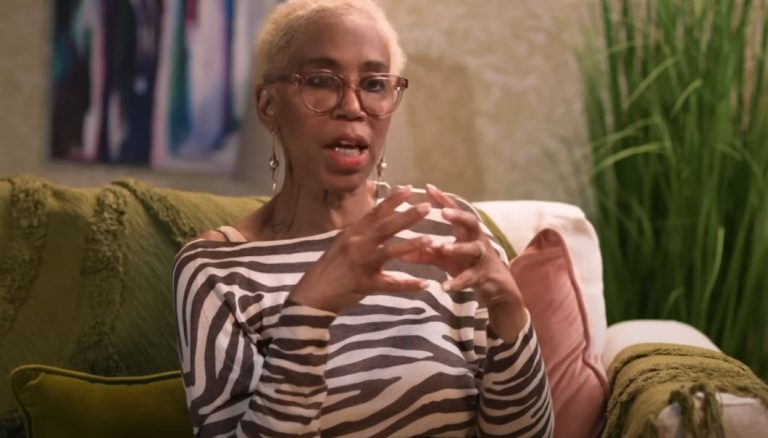The most frequently asked question by Celebrity Big Brother viewers over the past week is: why does Trisha have her own bedroom? At first glance, it might appear to be a preferential change to the show’s structure. When you take a closer look, however, you find a tale of tenacity, medical necessity, and how mainstream entertainment is finally learning to respect and accommodate real-life health journeys.
This choice is especially significant in the context of reality TV, a genre that isn’t frequently commended for its nuance. Stage 4 metastatic breast cancer is currently afflicting veteran broadcaster and mental health advocate Trisha Goddard. Instead of avoiding the limelight, she has bravely decided to venture into one of the most unpredictable realms of television. Additionally, in order to facilitate her involvement, producers have established a private area where she can continue her treatment, take her medication, and rest without being completely cut off from the shared experience.
Trisha Goddard – Health, Career & CBB Special Arrangement
| Attribute | Details |
|---|---|
| Full Name | Trisha Goddard |
| Age | 67 |
| Profession | Broadcaster, TV host, mental health advocate |
| Notable Work | Trisha Goddard Show (1998–2010), mental health commentary, U.S. TV appearances |
| Health Status | Diagnosed with stage 4 metastatic breast cancer (2022) |
| Reason for Private Room | Required rest, privacy, and health support during filming |
| Medical Collaboration | Oncology and palliative care teams coordinated with ITV producers |
| CBB Role | Active housemate with daily medical oversight |
| Past Similar Setup | Sharon Osbourne (CBB 2024) |
ITV developed a medically sound and emotionally intelligent setup by working closely with her oncologist and palliative care team. As she openly explained, Trisha came home with a “bag full of meds” and a treatment plan that was adjusted to fit the show’s production schedule. Her private space promotes integration rather than exclusion. It enables her to respect her body’s changing needs while still being totally present on the show.
The accommodations made for her are remarkably similar to those made for Sharon Osbourne’s appearance in 2024. However, Trisha’s case is unique because she is not only taking part, but she is also consciously changing the way that people with incurable cancer live their lives. Her decision to make this aspect of her life public is both extraordinarily courageous and subtly life-changing.
This arrangement feels especially novel in the entertainment industry. It invites viewers to observe something far more nuanced and inspirational—a woman who is not only fighting disease but also choosing joy, visibility, and shared experience—instead of insulating them from the realities of chronic illness.
Trisha has frequently stated that she wants to demonstrate that having cancer does not require one to stop living. In her pre-show interview, she said, “You can live with cancer and stay successful.” “You don’t have to fear death to the point where you fear life.” When conveyed in a friendly and non-sensational manner, this type of messaging is incredibly successful in changing public opinion.
Trisha’s appearance on this show is especially helpful for early-stage patients, caregivers, or anyone discreetly dealing with a terminal diagnosis. It provides a model of what is possible: how to speak up for yourself, how to continue being involved in your community, and how to normalize discussions about terminal illness.
The visuals are important. Trisha moved into her private space during the live launch while the other competitors crammed themselves into double mattresses and bunk beds. Some viewers, who were not initially aware of the medical backstory, questioned it. However, as more people discovered the cause, the reaction was overwhelmingly positive. Thousands of posts were shared on social media saying things like “she’s not letting cancer define her,” “she’s so brave,” and “she’s deeply inspiring.”
Big Brother is establishing a significant new standard by incorporating health-related accommodations into a program based on group dynamics. Because it adds grace rather than drama, this decision has significantly enhanced the season’s narrative arc.
Trisha has demonstrated a balance of engagement and self-care that is rarely seen on prime-time TV in recent days. She has been spotted working on projects, laughing with her roommates, and taking breaks in her room. Viewers, especially those who are impacted by illness, are unlikely to forget this portrayal, which subtly reframes our expectations.
The Significance of Trisha’s Room
She is not rewarded with her room. It is necessary. It is a symbol, though, more than anything else. A reminder that illness need not always be concealed, that our media systems can change, and that meaningful living can occur even in the most unlikely places—like the Big Brother house.
Thus, when we inquire, “What gives Trisha her own bedroom?” Comfort and favoritism are not the solution. It has to do with agency. In front of millions, it’s about respecting her body, her path, and her decision to keep living life to the fullest.


